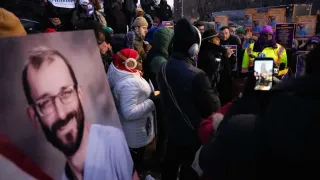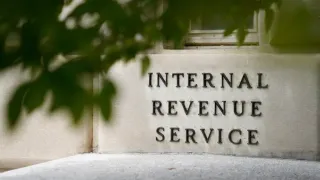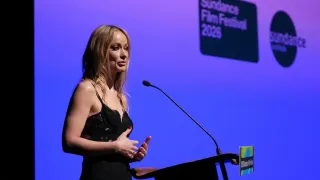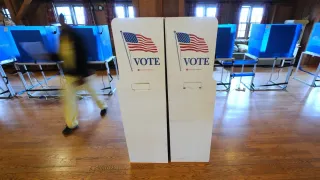February 4, 2017
SF Leaders Back LGBT History Projects
Matthew S. Bajko READ TIME: 6 MIN.
Plans to create a transgender historic district and a larger, freestanding LGBT history museum in San Francisco gained support at City Hall this week.
On Tuesday District 6 Supervisor Jane Kim introduced legislation to create the Compton's Transgender, Lesbian, Gay, and Bisexual (TLGB) District, which backers say will be the first legally recognized transgender district in the world. It will be named after Gene Compton's Cafeteria, a 24-hour eatery that had operated at 101 Taylor Street and was where transgender and queer patrons rioted against police harassment in the summer of 1966.
"By putting the T first we are being intentional in recognizing that trans women were among the first to be fighting for LGBT freedoms," said Aria Sa'id, a trans woman who is the programs director at the St. James Infirmary, a health clinic for sex workers that is located where the Compton's district will be created.
Kim's legislation is the result of a deal she helped broker between local developer Group I and LGBT activists who had appealed the planning commission's decision last year to allow the developer's massive in-fill project at 950?974 Market Street to move forward. The buildings there were once home to several gay bars and a shoe store that helped facilitate gay and transgender prostitution and hustling in the area.
The Q Foundation, on behalf of a number of LGBT activists, filed the appeal to call for greater scrutiny of the proposed development's environmental impacts, including if demolition of the existing structures would hinder forming the transgender historical district in the area. The Board of Supervisors was set to take up the matter at their meeting Tuesday.
But as the Bay Area Reporter first reported on its blog Monday afternoon, a deal was reached that paved the way for the LGBT activists to rescind their appeal of the project, thus allowing it to move forward. Group I plans to start razing the existing structures this month in order to construct its mixed-use development.
It will entail a 12-story, 120-foot-tall building with a 232-room hotel, 244 housing units, ground floor retail, and space for a local nonprofit theater company. There will also be a project off-site nearby with 60 below-market-rate units that the developer is helping to pay to build.
Group I has agreed to allow local historians to document the site before it is torn down and to pay $300,000 to the city toward the creation of the transgender historic district. As outlined in the deal, one-third of the money will be used by the Planning Department to support the creation of the Compton's TLGB Cultural Heritage District.
Another third will be used by the Mayor's Office of Housing and Community Development to support the creation of a transgender-focused community facility in the Tenderloin neighborhood. The remaining funds will be given to the Mayor's Office of Economic and Workforce Development to support one or more transgender-focused commercial or nonprofit storefront establishments in the Compton's neighborhood.
The developer had already agreed to dedicate a portion of the funding it is required to set aside for arts programs toward LGBT initiatives. At the request of Shayne Watson, a lesbian and architectural historian hired by Group I as a consultant, $75,000 was dedicated toward the creation of a larger LGBT historical district in the Tenderloin. There is also $27,000 to be used to support LGBTQ performances and/or arts programming.
"Reaching this important milestone would not have been possible without the dedicated work of our community partners and supporters. We look forward to moving the project forward, and are grateful for your continued support," wrote Group I President and CEO Joy Ou in an emailed statement Tuesday morning.
At a news conference that afternoon, Kim said the Compton's district would be "a living, breathing expansion of our commitment to the TLGB community."
The district will encompass six blocks in the southeastern Tenderloin and will cross over Market Street to include two blocks of 6th Street. The intersection of Turk and Taylor Street - now called Compton's Cafeteria Way and Vikki Mar Lane - will be the center of the new Compton's district. Organizers hope it will be a hub of services and economic opportunities for trans and gender-nonconforming communities, as well as a place to honor the community's history.
"We are looking forward to seeing what we are going to cultivate in our district," said Janetta Johnson, executive director of the Tenderloin-based Transgender Gender-Variant Intersex Justice Project and a founding member of the Compton's District Coalition.
Some ideas already being floated include seeing more trans and queer nightlife venues open in the district, re-entry housing for transgender people who were formerly incarcerated, housing for trans women, a museum devoted to telling the neighborhood's trans history, and support for trans and gender non-conforming business owners in the area.
"We know that any efforts to save the history of this neighborhood had to include efforts to protect the existing TLGB businesses, and even more important, protect the TLGB people who call the Compton's district home and are at serious threat of displacement," stated Brian Basinger, executive director of the Q Foundation.
Once Kim's legislation is approved by the board and signed by Mayor Ed Lee, her office will convene a task force with members from the community and various city agencies to ensure the Compton's district becomes a reality within eight months. In addition to city recognition, supporters of the district plan to also seek state and federal historic recognition for it.
Supes back LGBT history museum project
Also during their meeting Tuesday, the supervisors voted unanimously to endorse the GLBT Historical Society's plan to build a larger history museum in the city.
Gay District 8 Supervisor Jeff Sheehy authored the resolution, which was co-sponsored by Kim. According to the GLBT Historical Society, only one other municipality in the world is known to have passed a resolution of official support for the establishment of an LGBTQ public history institution. In December 2014, the City Council of Paris voted to call on the mayor and other city officials to support the creation of a French national LGBTQ archives.
"Our communities have existed since time immemorial, yet our histories continually get erased. As recently as 1933 in what had been fabulously queer Berlin, Magnus Hirschfeld's Institute of Sexual Research along with the Museum of Sex were destroyed by the Nazis and people from our communities were taken to concentration camps," Sheehy told the B.A.R. "The last 10 days have reminded me of those times and asserting our rights to our history is not only about remembering our past, but is also a powerful act of resistance."
After being hired last year as the nonprofit's new executive director, Terry Beswick made finding a permanent site to house the museum a priority by 2020, when the lease of its current museum space, on 18th Street in the Castro, is set to expire. It first opened in 2011, but with just 1,600 square feet, there is only room for two small galleries and seating room for up to 50 people for events and talks held there.
"We have too many stories to contain in our small Castro museum," Beswick told the B.A.R. this week.
Last year, the supervisors appropriated $150,000 toward the effort, which the GLBT Historical Society has used to fund a strategic planning process. Through its Vision2020 fundraising campaign for the new museum, which was launched in October last year, nearly $200,000 has already been raised. With a fiscal year 2017 budget of $1 million, the organization is preparing to scale up for a full-fledged capital campaign, said Beswick.
By having official backing from the supervisors for the new museum, Beswick now plans to lobby the mayor for financial support from the city and other assistance for the project. He is also looking to partner with developers to identify a site for what is billed as the New Museum of LGBTQ History and Culture.
"The point is to get City Hall on board and call for the mayor's leadership in support of the project," said Beswick, similar to the efforts Lee engaged in to convince filmmaker George Lucas to build his narrative arts museum in the city. (Last month Lucas announced he would instead build it in Los Angeles.)
"This is a call for a world class museum I think San Francisco has earned through our contributions to LGBTQ history," said Beswick. "To me this is a civil rights issue. We need to claim our own space for young LGBT people and visitors from around the world to learn about that history."






